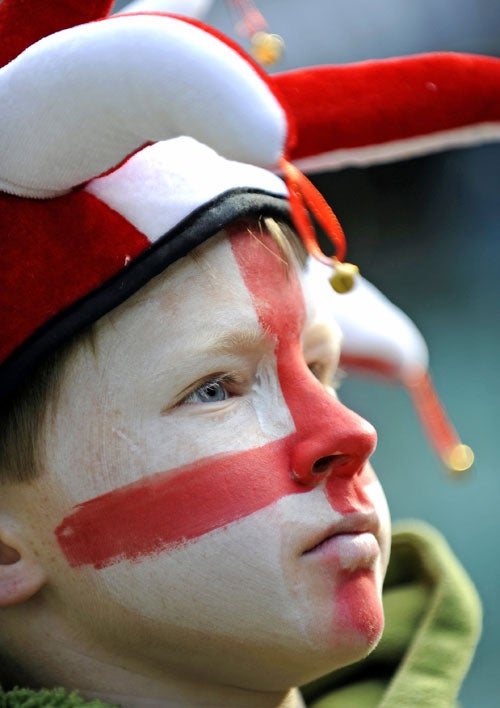50,000 England fans to go but are they safe and can South Africa cope?
With 200 days until the World Cup, Steve Tongue answers the key questions

Your support helps us to tell the story
From reproductive rights to climate change to Big Tech, The Independent is on the ground when the story is developing. Whether it's investigating the financials of Elon Musk's pro-Trump PAC or producing our latest documentary, 'The A Word', which shines a light on the American women fighting for reproductive rights, we know how important it is to parse out the facts from the messaging.
At such a critical moment in US history, we need reporters on the ground. Your donation allows us to keep sending journalists to speak to both sides of the story.
The Independent is trusted by Americans across the entire political spectrum. And unlike many other quality news outlets, we choose not to lock Americans out of our reporting and analysis with paywalls. We believe quality journalism should be available to everyone, paid for by those who can afford it.
Your support makes all the difference.What's the timetable?
On Friday week, 4 December, the 32 teams will be divided into eight groups, with one seed in each. South Africa, as hosts, will be one of the seeded teams; two days before the draw the organising committee will choose the other seven. England should be one of the seven because it is based on a combination of previous World Cup records and last month's Fifa world rankings (not the new ones which were announced yesterday, because that would reflect too much bias towards the play-off winners). Provisional squads of 35 have to be named in early May and the opening game, featuring South Africa at Soccer City, will be on the afternoon of Friday 11 June.
Are the stadiums on schedule and on budget?
On schedule, though not on budget. The organisers are confident that all 10 venues will be completed before the draw, six months ahead of the tournament. Few, if any, have not overspent; in Cape Town, for instance, the original £200 million cost has shot up to £450m.
How good will they be?
From excellent to superb. Cape Town's Green Point, with its backdrop of Table Mountain, Durban's arch that puts Wembley's in the shade and Soccer City, the Johannesburg venue for the first game and the final, are spectacular. With capacities of 70,000-plus, the only worry is how effectively they will be used after the World Cup, as each of those cities already has a rugby stadium.
How many England supporters are expected?
The organisers' estimate is anything between 30,000 and 50,000, although some British travel agents are beginning to doubt the higher figures after a slow take-up. But more than 50,000 tickets have already been sold in the United Kingdom and renewed interest is expected after the draw. Phase three of ticketing sales will then begin, with each opposing team offered 12 per cent of capacity at their three group matches. England's will be on sale only to members of the official supporters' club, Englandfans.
Can South Africa cope?
Even Danny Jordaan, chief executive and mastermind of the whole operation, admits: "I think we have enough accommodation, but not always in the right places. In some of the host cities, we will have to accommodate people outside the host city, move them in and move them back." An extra 1,000 buses and 200 planes will be available for that purpose and the aircraft will be used as a shuttle service, taking passengers back from games as soon as they are at the airport rather than waiting for a particular flight. Rail services are poor and there has been a delay to the new Gau-train, supposed to be linking the main Johannesburg airport with the city.
Will they be safe?
South Africa, on its own admission, has 50 murders per day, the same number of attempted murders and almost as many carjackings. There will be 41,000 police on duty, plus private security firms, and police officers from other countries including England wearing their own uniforms. The advice is to take the same precautions as the thousands of tourists who visit the country every year: don't stray off the beaten track, don't walk around alone at night in quiet areas and so on. The police, often criticised for heavy-handedness, will also come down hard on any drunkenness or hooliganism.
What does it all mean to South Africa as a nation?
A huge amount. "We know all the negative perceptions out there," Jordaan says. "It's about nation-branding of South Africa with a new image." The organising committee chairman Irvin Khoza adds: "It's a day-to-day window for showcasing the country. People who come here for 2010 will go back with positive images and will communicate that to their friends."
So how successful a World Cup will it be?
One local journalist says: "I think the finals will be a success, though perhaps not by German standards. The World Cup on the surface is about football. The reality is a Swiss banker's dream – money. What percentage of revenue will go straight out of South Africa? I think big dollars will move from one EU bank account to another." So, as ever, there will be questions about the legacy that is left, but taken on its own terms – noisy, colourful and occasionally chaotic – what's being called the first full-colour World Cup has a good chance of being a memorable one.
Join our commenting forum
Join thought-provoking conversations, follow other Independent readers and see their replies
Comments